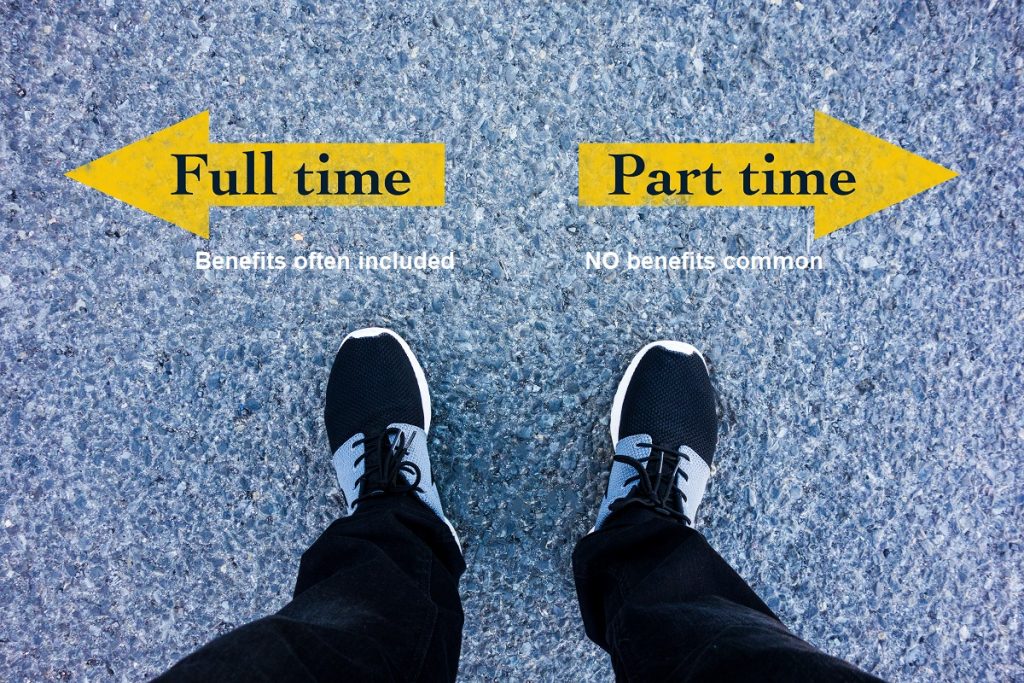Flexibility, no commute, and the ability to work your own hours are benefits of working at home, but what about vacations, health insurance, stock options, and 401K contributions? Some companies offer them, but they may only be available to full-time workers or at the employee’s expense.
Part-time remote workers often have no healthcare, vacations, or 401K benefits, but increasingly, many work-from-home jobs with benefits are available for full-time employees.
From customer support to human resources, tech, and more, full-time employees working from home can get health benefits, including dental, vision, and disability, as well as 401(k), paid time off, and wellness programs.
What employee benefits should you look for when applying for work-from-home positions? What companies frequently hire remote customer service representatives, software engineers, social media managers, or tech support agents with health care, vacations, child care, and more? What else is important to know in your remote job search regarding benefits?
Table of Contents
What Are The Benefits Of Working From Home?
During the pandemic, many people formerly tied to an office worked from home. They found that work-from-home jobs have numerous benefits, including:
- Decreased stress
- Better focus, leading to improved work performance
- The ability to save time and money usually spent on commuting
- Flexible schedule
- Better work-life balance
- Freedom to work from your personalized home office
In the post-pandemic world, hybrid and remote job opportunities are plentiful. Those forced to work from out during the pandemic decided they liked it and now either want to continue doing so with their current employer or find a new one. However, they want to keep the benefits packages they had while working from an office.

Do You Get Other Employee Benefits From Working From Home?
Depending on their industry and employer, many workers need and expect standard employee benefits, such as:
- Health insurance (may include short and long-term disability insurance)
- Vision insurance
- Dental insurance
- Retirement plans
- Life insurance
- Paid medical leave
- Vacations
To be competitive, some employers offer more with a tempting benefits package consisting of:
- Tuition reimbursements
- Flexible spending accounts
- Employee assistance programs
- Paid training
- Performance incentives
- Profit sharing bonuses
- Stocks
- Employee discounts
Additionally, some companies provide remote employees with work equipment necessary for their remote positions. Moreover, they may offer wellness programs.
Those improve an employee’s well-being and focus on both mental and physical health, typically including paid or discounted gym memberships, mental health resources, and health screenings.
What Companies Provide Employee Benefits Like Vacation, Insurance, or 401Ks?
Healthcare, health insurance, staffing, consumer goods and services, tech, marketing, and customer care industries are some examples of industries where remote working is possible nowadays. Top companies across these fields that are known for offering both basic and additional employee benefits are the following:
| Aon | Amazon | Concentrix |
| ABC Fitness Solutions | American Airlines | Home Shopping Network |
| Adecco | Apple | Humana |
| ADP | Asurion | Neiman Marcus |
| Aetna | Change Healthcare | Sykes Enterprises |

How Do You Qualify For Benefits If You Work From Home?
Employee benefit eligibility usually depends on employment status. The easiest way to qualify is to have a full-time remote or hybrid job.
Many companies only used to have onsite employment but are now either going fully remote or allowing some workers to work out of the office. If one of those work-at-home jobs is a good fit for you, you should expect the same benefits you got onsite.
Keep in mind that other factors, such as company policy, may also affect your eligibility for specific benefits. However, a legitimate company should offer benefits protected by law at the minimum, whether the role is in-person, hybrid, or remote.
These may vary by state but generally include the minimum wage, paid overtime, unemployment, and disability.

Why Is This a Big Problem For Some Workers
Full-time remote workers qualify for basic or secondary benefits easier than part-time employees. Part-timers may be offered a different, smaller set of benefits, while independent contractors usually don’t get any.
This is challenging for those two groups for several reasons. Lack of health insurance or the high cost of getting a plan makes it unaffordable for many workers without partners with health plans. This leads to insufficient protection when you need it the most — emergency surgery, disability, etcetera.
Low wages negatively impact Social Security contributions and, consequently, retirement plans. Low average indexed monthly earnings (AIME) will lessen your Social Security benefits down the line.
Lack of paid vacation or PTO makes seeking time off a hardship for some. Working long hours increases stress and causes burnout, so you need to recharge. If you don’t have PTO, taking time off work may put a strain on you and your family. Plus, not having PTO leads to reduced job satisfaction due to employees not feeling valued.
Are Benefits Affordable For Part-Time Employees?
Companies offer part-time employee benefits at their discretion. Some employers don’t offer them at all. When they do, the benefits are directly connected to the minimum number of working hours. They may include paid time off and retirement plan participation, but sometimes they are just flexible hours and perks such as employee discounts.
Affordability mainly depends on how much you make and how much you can spend out of pocket in unexpected situations where you need to be covered. Many people in entry-level positions or those in such great need that they accept whatever job they can get are often not able to stay afloat through emergencies.
Part-timers who want to make a career out of freelancing and who want professional development opportunities often seek out companies that offer decent part-time employee benefits for entry-level and senior-level remote companies.
Some companies that offer benefits for part-timers include:
Similar companies and specific job ads are found on job boards like FlexJobs and Indeed.


